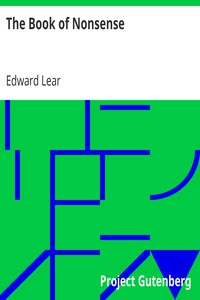Nonsense Songs by Edward Lear (thriller book recommendations TXT) 📗

- Author: Edward Lear
Book online «Nonsense Songs by Edward Lear (thriller book recommendations TXT) 📗». Author Edward Lear
And so, in truth, it was: and they soon found that what they had taken for an immense wig was in reality the top of the Cauliflower; and that he had no feet at all, being able to walk tolerably well with a fluctuating and graceful movement on a single cabbage-stalk,—an accomplishment which naturally saved him the expense of stockings and shoes.
Presently, while the whole party from the boat was gazing at him with mingled affection and disgust, he suddenly arose, and, in a somewhat plumdomphious manner, hurried off towards the setting sun,—his steps supported by two superincumbent confidential Cucumbers, and a large number of Waterwagtails proceeding in advance of him by three and three in a row,—till he finally disappeared on the brink of the western sky in a crystal cloud of sudorific sand.
So remarkable a sight, of course, impressed the four children very deeply; and they returned immediately to their boat with a strong sense of undeveloped asthma and a great appetite.
Shortly after this, the travellers were obliged to sail directly below some high overhanging rocks, from the top of one of which a particularly odious little boy, dressed in rose-colored knickerbockers, and with a pewter plate upon his head, threw an enormous pumpkin at the boat, by which it was instantly upset.
But this upsetting was of no consequence, because all the party knew how to swim very well: and, in fact, they preferred swimming about till after the moon rose; when, the water growing chilly, they sponge-taneously entered the boat. Meanwhile the Quangle-Wangle threw back the pumpkin with immense force, so that it hit the rocks where the malicious little boy in rose-colored knickerbockers was sitting; when, being quite full of lucifer-matches, the pumpkin exploded surreptitiously into a thousand bits; whereon the rocks instantly took fire, and the odious little boy became unpleasantly hotter and hotter and hotter, till his knickerbockers were turned quite green, and his nose was burnt off.
Two or three days after this had happened, they came to another place, where they found nothing at all except some wide and deep pits full of mulberry-jam. This is the property of the tiny, yellow-nosed Apes who abound in these districts, and who store up the mulberry-jam for their food in winter, when they mix it with pellucid pale periwinkle-soup, and serve it out in wedgewood china-bowls, which grow freely all over that part of the country. Only one of the yellow-nosed Apes was on the spot, and he was fast asleep; yet the four travellers and the Quangle-Wangle and Pussy were so terrified by the violence and sanguinary sound of his snoring, that they merely took a small cupful of the jam, and returned to re-embark in their boat without delay.
What was their horror on seeing the boat (including the churn and the tea-kettle) in the mouth of an enormous Seeze Pyder, an aquatic and ferocious creature truly dreadful to behold, and, happily, only met with in those excessive longitudes! In a moment, the beautiful boat was bitten into fifty-five thousand million hundred billion bits; and it instantly became quite clear that Violet, Slingsby, Guy, and Lionel could no longer preliminate their voyage by sea.
The four travellers were therefore obliged to resolve on pursuing their wanderings by land: and, very fortunately, there happened to pass by at that moment an elderly Rhinoceros, on which they seized; and, all four mounting on his back,—the Quangle-Wangle sitting on his horn, and holding on by his ears, and the Pussy-Cat swinging at the end of his tail,—they set off, having only four small beans and three pounds of mashed potatoes to last through their whole journey.
They were, however, able to catch numbers of the chickens and turkeys and other birds who incessantly alighted on the head of the Rhinoceros for the purpose of gathering the seeds of the rhododendron-plants which grew there; and these creatures they cooked in the most translucent and satisfactory manner by means of a fire lighted on the end of the Rhinoceros's back. A crowd of Kangaroos and gigantic Cranes accompanied them, from feelings of curiosity and complacency; so that they were never at a loss for company, and went onward, as it were, in a sort of profuse and triumphant procession.
Thus in less than eighteen weeks they all arrived safely at home, where they were received by their admiring relatives with joy tempered with contempt, and where they finally resolved to carry out the rest of their travelling-plans at some more favorable opportunity.
As for the Rhinoceros, in token of their grateful adherence, they had him killed and stuffed directly, and then set him up outside the door of their father's house as a diaphanous doorscraper.
CHAPTER I.
INTRODUCTORY.
In former days,—that is to say, once upon a time,—there lived in the Land of Gramble-Blamble seven families. They lived by the side of the great Lake Pipple-Popple (one of the seven families, indeed, lived in the lake), and on the outskirts of the city of Tosh, which, excepting when it was quite dark, they could see plainly. The names of all these places you have probably heard of; and you have only not to look in your geography-books to find out all about them.
Now, the seven families who lived on the borders of the great Lake Pipple-Popple were as follows in the next chapter.
CHAPTER II.
THE SEVEN FAMILIES.
There was a family of two old Parrots and seven young Parrots.
There was a family of two old Storks and seven young Storks.
There was a family of two old Geese and seven young Geese.
There was a family of two old Owls and seven young Owls.
There was a family of two old Guinea Pigs and seven young Guinea Pigs.
There was a family of two old Cats and seven young Cats.
And there was a family of two old Fishes and seven young Fishes.
CHAPTER III.
THE HABITS OF THE SEVEN FAMILIES.
The Parrots lived upon the Soffsky-Poffsky trees, which were beautiful to behold, and covered with blue leaves; and they fed upon fruit, artichokes, and striped beetles.
The Storks walked in and out of the Lake Pipple-Popple, and ate frogs for breakfast, and buttered toast for tea; but on account of the extreme length of their legs they could not sit down, and so they walked about continually.
The Geese, having webs to their feet, caught quantities of flies, which they ate for dinner.
The Owls anxiously looked after mice, which they caught, and made into sago-puddings.
The Guinea Pigs toddled about the gardens, and ate lettuces and Cheshire cheese.
The Cats sate still in the sunshine, and fed upon sponge biscuits.
The Fishes lived in the lake, and fed chiefly on boiled periwinkles.
And all these seven families lived together in the utmost fun and felicity.
CHAPTER IV.
THE CHILDREN OF THE SEVEN FAMILIES ARE SENT AWAY.
One day all the seven fathers and the seven mothers of the seven families agreed that they would send their children out to see the world.
So they called them all together, and gave them each eight shillings and some good advice, some chocolate-drops, and a small green morocco pocket-book to set down their expenses in.
They then particularly entreated them not to quarrel; and all the parents sent off their children with a parting injunction.
"If," said the old Parrots, "you find a cherry, do not fight about who should have it."
"And," said the old Storks, "if you find a frog, divide it carefully into seven bits, but on no account quarrel about it."
And the old Geese said to the seven young Geese, "Whatever you do, be sure you do not touch a plum-pudding flea."
And the old Owls said, "If you find a mouse, tear him up into seven slices, and eat him cheerfully, but without quarrelling."
And the old Guinea Pigs said, "Have a care that you eat your lettuces, should you find any, not greedily, but calmly."
And the old Cats said, "Be particularly careful not to meddle with a clangle-wangle if you should see one."
And the old Fishes said, "Above all things, avoid eating a blue boss-woss; for they do not agree with fishes, and give them a pain in their toes."
So all the children of each family thanked their parents; and, making in all forty-nine polite bows, they went into the wide world.
CHAPTER V.
THE HISTORY OF THE SEVEN YOUNG PARROTS.
The seven young Parrots had not gone far, when they saw a tree with a single cherry on it, which the oldest Parrot picked instantly; but the other six, being extremely hungry, tried to get it also. On which all the seven began to fight; and they scuffled,
and huffled, and ruffled, and shuffled, and puffled, and muffled, and buffled, and duffled, and fluffled, and guffled, and bruffled, and screamed, and shrieked, and squealed, and squeaked, and clawed, and snapped, and bit, and bumped, and thumped, and dumped, and flumped each other, till they were all torn into little bits; and at last there was nothing left to record this painful incident except the cherry and seven small green feathers.
And that was the vicious and voluble end of the seven young Parrots.
CHAPTER VI.
THE HISTORY OF THE SEVEN YOUNG STORKS.
When the seven young Storks set out, they walked or flew for fourteen weeks in a straight line, and for six weeks more in a crooked one; and after that they ran as hard as they could for one hundred and eight miles; and after that they stood still, and made a himmeltanious chatter-clatter-blattery noise with their bills.
About the same time they perceived a large frog, spotted with green, and with a sky-blue stripe under each ear.
So, being hungry, they immediately flew at him, and were going to divide him into seven pieces, when they began to quarrel as to which of his legs should be taken off first. One said this, and another said that; and while they were all quarrelling, the frog hopped away. And when they saw that he was gone, they began to chatter-clatter,
blatter-platter, patter-blatter, matter-clatter, flatter-quatter, more violently than ever; and after they had fought for a week, they pecked each other all to little pieces, so that at last nothing was left of any of them except their bills.
And that was the end of the seven young Storks.
CHAPTER VII.
THE HISTORY OF THE SEVEN YOUNG GEESE.
When the seven young Geese began to travel, they went over a large plain, on which there was but one tree, and that was, a very bad one.
So four of them went up to the top of it, and looked about them; while the other three waddled up and down, and repeated poetry, and their last six lessons in arithmetic, geography, and cookery.
Presently they perceived, a long way off, an object of the most interesting and obese appearance, having a perfectly round body exactly resembling a boiled plum-pudding, with two little wings, and a beak, and three feathers growing out of his head, and only one leg.
So, after a time, all the seven young Geese said to each other, "Beyond all doubt this beast must be a Plum-pudding Flea!"
On





Comments (0)